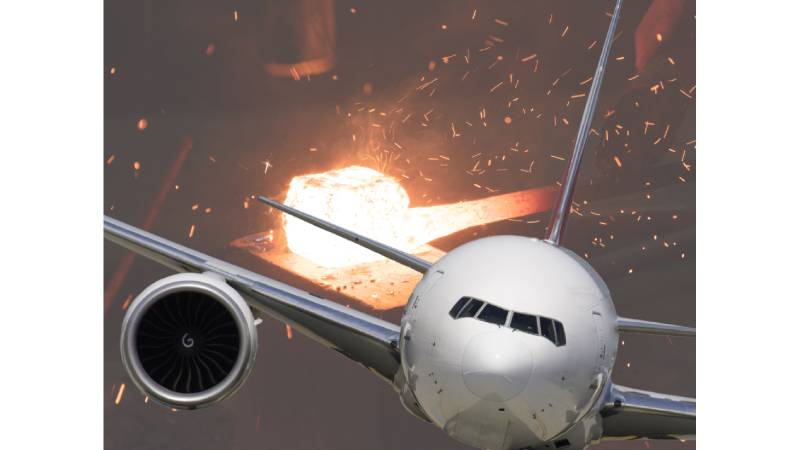When aviation disasters strike, the spotlight often turns to the tiniest components. TechJet’s meticulous manufacturing ensures that aerofoils—the flight-critical parts at the heart of every engine—deliver unmatched safety and reliability

In December 2024, tragedy struck when a passenger plane crashed in South Korea, claiming numerous lives. While investigations are ongoing, early reports suggest that no single failure can be ruled out. From minor component flaws to critical system malfunctions, any part of an aircraft has the potential to spark catastrophic consequences if it doesn’t meet the rigorous standards of safety and performance required in aviation.
This devastating incident was not an isolated one. Just months earlier, another commercial jet experienced a mid-flight engine failure due to an undetected material defect in an engine blade, forcing an emergency landing. These incidents underline a grim reality: aviation safety hinges on absolute precision in every element of an aircraft. Every component—from a wing panel to the smallest aerofoil blade—must perform flawlessly.
These tragedies highlight the importance of specialized manufacturing processes designed to prevent such failures. At the heart of jet engines are aerofoils—components critical to flight dynamics and efficiency. These parts, from compressor blades to turbine vanes, are essential to ensuring safe and efficient operations. What ensures their reliability, however, are the specialized processes behind their production, processes that exemplify the advanced manufacturing capabilities of companies like TechJet.
Why Aerofoils Matter
Aerofoils, integral components of jet engines, have a history rooted in the early evolution of aviation. In the pioneering days of powered flight, engineers quickly realized that specialized designs were needed to optimize airflow and engine efficiency. Over time, as jet propulsion replaced piston engines, aerofoil technology advanced to meet the needs of increasingly complex and powerful engines. Today, they are critical for compressing air and generating the thrust that powers modern aircraft.
The global reliance on air travel underscores their importance. With growing demands for fuel efficiency and reduced emissions, lightweight yet durable aerofoils have become essential. However, their role comes with high stakes: even minor imperfections can lead to engine failure, causing costly repairs or grounding entire fleets. This makes the precision in their manufacturing not just a technical challenge but a necessity for safety and reliability in aviation.
A Snapshot of the Aerofoil Market
The aerofoil market, valued at over $1.2 billion globally, is projected to grow steadily over the next decade, at a CAGR of 6%, driven by the aviation industry’s recovery post-pandemic and the advent of advanced engine technologies. As airlines and manufacturers prioritize fuel efficiency and reduced environmental impact, the demand for lightweight, high-performance aerofoils has surged.
This growth is accompanied by increased competition among aviation manufacturers, who strive to produce the most efficient designs. Suppliers face mounting pressure not only to meet high production volumes but also to adhere to stringent quality and performance benchmarks. For instance, defects in aerofoil components can lead to significant financial losses, as unplanned engine repairs cost airlines billions of dollars annually. Furthermore, regulatory compliance, including adherence to international standards such as NADCAP, adds another layer of complexity to production.
An aerofoil is a complex interplay of engineering disciplines, encompassing forging, machining, and finishing. Compressor blades, in particular, require exceptional precision. Made from superior alloys such as titanium, nickel, and stainless steel, they must endure extreme temperatures, high pressures, and demanding aerodynamic loads. Achieving these specifications involves technical skill and a mastery of specialized processes. Manufacturers that integrate advanced techniques, such as automated inspections and precision forging, are increasingly poised to meet the demands of this evolving market by ensuring consistent quality and performance.
Techjet’s Secret Sauce
Founded in 1999, Techjet Aerofoils has mastered the art of producing compressor blades with unmatched precision. Key to their success is the integration of Fluorescent Penetrant Inspection (FPI), a cornerstone process in identifying microscopic cracks and surface defects that are otherwise invisible to the naked eye.
FPI relies on applying a special fluorescent dye to the blade’s surface. The dye penetrates even the smallest cracks or irregularities, thanks to its low surface tension and viscosity. Once the dye is applied, the blade undergoes a meticulous cleaning process to remove excess material, leaving only the dye trapped within surface defects. The next stage involves applying a developer, which draws the trapped dye back to the surface, creating clear, visible indications of potential flaws under ultraviolet light.
The process is highly precise in controlled conditions and dark rooms. Skilled inspectors use ultraviolet lamps to examine the blades, separating defective parts from those that meet the highest quality standards. By automating significant portions of this workflow, Techjet ensures consistency and efficiency, inspecting thousands of blades daily while maintaining rigorous adherence to aviation benchmarks.
FPI’s value extends beyond defect detection. It safeguards against potential operational failures by ensuring that each blade fully complies with international safety standards. This commitment to precision and quality control underscores Techjet’s dedication to delivering reliable components to the aviation industry.
The Final Question
As the aviation industry pushes the boundaries of performance and sustainability, the need for reliable and innovative aerofoil manufacturers has never been greater. How will your next choice in manufacturing partners impact the success of your engines? The answer lies in the processes and people behind them.
By leveraging advanced automation and maintaining a highly skilled inspection team, Techjet achieves reliability and efficiency comparable to industry giants. Their streamlined approach, which integrates multiple stages of production under one roof—from forging to final inspection—translates into faster lead times and cost-effective solutions for their clients. Now, it is no surprise that Techjet’s compressor blades are in the iconic airplane models of Boeing, Airbus, Gulfstream, and more.